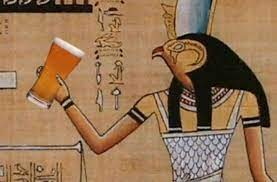"FOOD HABITS OF TAMILS" PART / "பண்டைய சுமேரியரின் உணவு பழக்கங்கள் தொடர்கிறது"" / "Food Habits Of Ancient Sumer continuing"" [தமிழிலும் ஆங்கிலத்திலும் / In Tamil and English]
மனிதர்களால் தயாரிக்கப்படும் பழமையான பானங்களில் ஒன்று பியர் மது ஆகும். இரசாயன ரீதியாக உறுதிப்படுத்தப்பட்ட முதல் பார்லி பியர் மது - நவீன ஈராக்கின் ஒரு பகுதியான மெசொப்பொத்தேமியா பகுதியில் கிமு 5 ஆம் மில்லினியத்தில் இருந்து பாவனையில் இருந்தது தெரியவருகிறது. மேலும் மது தெய்வம் - நின்காசியைக் கௌரவிக்கும் 3800 / 3,900 ஆண்டுகள் பழமையான சுமேரியக் கவிதை ஒன்று பார்லி ரொட்டியில் இருந்து பியர் மது காய்ச்சும் செய்முறையையும் ஒரு வரிசைக் கிரமத்தில் வழங்குகிறது. இன்று நம்மிடம் உள்ள பழமையான செய்முறை புத்தகம் இதுவேயாகும். இது தனது வர்ணனையை இப்படி தொடர்கிறது:
"....... நின்காசி, நியே பிசைந்த மாவை [dough] ஒரு பெரிய மண்வாரி [shovel] மூலம்
குழியில் ஒன்று சேர்க்கிறாய் - பார்லி ரொட்டியையும் [bappir] தேனையும் -
நின்காசி, நியே பார்லி ரொட்டியை பெரிய சூளையில் வேக வைக்கிறாய் -
உமி தானியங்களை [hulled grains] ஒரு ஒழுங்காக குவித்து -
நியே பார்லி முளைதானியத்திற்கு [malt] தண்ணீர் விடுகிறாய் -
அங்கு பெரும் அதிகாரம் உள்ளவர்களையும்
உன் மேன்மை பொருந்திய நாய் காத்து தள்ளி விடுகிறது -
நின்காசி, நியே பார்லி முளை தானியத்தை சாடியில் ஊற வைக்கிறாய் -
அலைகள் ஏறுகின்றன, அலைகள் இறங்குகின்றன -
நின்காசி, நியே சமைத்த கூழாகிய களியை [cooked mash]
நாணல் பாயில் பரப்புகிறாய் -
சூடு தணிகிறது, குளிர்ச்சி வெற்றி கொள்கிறது -
நியே உனது இரு கையாளும் சாராயத்துக்கான
இனிக்கும் மாவூறலை [great sweet wort] வைத்து இருக்கிறாய் -
அதை தேனுடனும் திராட்சைரசத்துடனும் வடிக்கிறாய் -
நின்காசி, வடி கட்டும் பெரும் மரத்தொட்டி
ஒரு இன்பமான ஒலியை தருகிறது -
நீ சேகரிக்கும் பெரும் மரத்தொட்டியில் [large collector vat] சரியாக வைக்கிறாய்... "
[தமிழாக்கம் : கந்தையா தில்லைவிநாயகலிங்கம்]
மேலும் இந்த பாடலில் இரண்டாவது வரியில் குறிக்கப்பட்ட தேன், அதிகமாக பேரீச்சம் பழம் சாறாக இருக்கலாம்? என பொதுவாக கருதப்படுகிறது. வாசனை சுவை கொடுப்பதற்கு இங்கு பேரீச்சம் பழம் சேர்க்கப்பட்டு இருக்கலாம்?. மேலும் இந்த பியர் மது வடித்தலின் போது சேர்க்கப்பட்ட சுமேரியரின் இரு தடவை வேகவைத்த பார்லி ரொட்டி அல்லது "பப்பிர்"க்கு [bappir] ஒன்றுக்கு மேற்பட்ட நோக்கங்களை நிறைவேற்றுகிறது. ஒன்று சர்க்கரை உற்பத்திக்கான மாப்பொருளைத் தருகிறது. மற்றது அரைத்தலுக்கான புரதத்தையும், பியர் மது பானத்திற்கு சுவையையும் தருகிறது, எட்டாவது வரியில் வரும் அலைகள் ஏறி இறங்குகின்றன என்ற அசைவு - மறை முகமாக அங்கு நடைபெற்ற அரைத்தலை குறிக்கலாம்? அத்துடன் மேல் அதிக பார்லி உடன் முளை தானியமும் பப்பிரும் அப்பொழுது சேர்க்கப்பட்டு இருக்கலாம்? அத்துடன் இந்த கடைந்து செய்த மசியல் அதிகமாக சூடாகியும் இருக்கலாம்?. கூழாகிய களியை பாயில் பரப்புவது, உமியை அகற்றவும் மற்றது திரவம் வடியவும் உதவி இருக்கலாம்? அது மட்டும் அல்ல, சாராயத்துக்கான மாவூறல் நன்கு குளிர்ச்சியாக இருந்தால், நொதித்தல் அல்லது புளித்தல் திறமையாக நடை பெரும். ஏன் என்றால் உயர் வெப்பம் மாவை புளிக்க வைக்க உதவும் பொருளின் [yeast / புளிச்சொண்டியின் ] ஆற்றலை குறைத்து விடும் என்பதால் ஆகும். கடைசியில் வரும், தேனுடனும் திராட்சைரசத்துடனும் வடிக்கிறாய் என்பதில், கட்டாயம் அது திராட்சை ரசமாக இருக்க முடியாது. ஏனென்றால், திராட்சை பழம் அல்லது உலர்ந்த திராட்சையின் தோலில் இயற்கையாகவே "ஈஸ்ட்" ['yeast'] காணப்படுகிறது. ஆனால் வைனில் [wine] அப்படி அல்ல. அங்கு "ஈஸ்ட்" இன் செயற்பாடு அற்று காணப்படுகிறது. ஆகவே இது திராட்சை ரசமாக இருக்கமுடியாது. அது அதிகமாக திராட்சை பழம் அல்லது உலர்ந்த திராட்சையாக இருக்கலாம்? மரத்தொட்டி தரும் இன்பமான ஒலி அதிகமாக, சொட்டு சொட்டாக மரத் தொட்டிக்குள் வடியும் பியர் மது பானத்தின் சத்தமாக இருக்கலாம்?.
அது மட்டும் அல்ல, இந்த துதி பாடலில் இருந்து நாம் எப்படியான பாராட்டுதலை அல்லது புகழ்ச்சியை, "பியர் மதுபான பெண் தெய்வம் [beer
goddess]" பெற்றால் என்பதையும் அறிய முடிகிறது. "நின்காசியே, நியே, வடித்த பியர் மது பானத்தை, மரத் தொட்டியில் இருந்து ஊற்றுகிறாய், அது டைகிரிஸ், யூபிரட்டீஸ் ஆறு மாதிரி வேகமாய்ப் பாய்கிறது" என்பதும் "குடிப்பவர்களிடம் ஒரு கவலையும் இல்லா, பேரின்ப மனோநிலையை ஏற்படுத்தக் கூடியதாக,
அதை நீ தயாரித்து எமக்கு அளிக்கிறாய்" என்பதும் நின்காசியின் புகழைப் பாடுகிறது.
நன்றி-[கந்தையா தில்லைவிநாயகலிங்கம்,
அத்தியடி, யாழ்ப்பாணம்]
பகுதி
: 15 தொடரும்…..
👉அடுத்த பகுதியை வாசிக்க அழுத்துக
Theebam.com: "தமிழரின் உணவு பழக்கங்கள்"-பகுதி: 15:
👉ஆரம்பத்திலிருந்து வாசிக்க அழுத்துக
Theebam.com: "தமிழரின் உணவு பழக்கங்கள்"பகுதி: 01:
"FOOD HABITS OF TAMILS" PART: 14 "Food Habits Of Ancient Sumer continuing"
Beer became so important to ancient Mesopotamian culture that the Sumerians created a goddess of brewing and beer, Ninkasi, and one anonymous poet, smitten with her powers, penned a hymn to her in 1800 / 1900 B.C. This “Hymn to Ninkasi,”also gives us a recipe for brewing ancient Sumerian beer — the oldest recipe book we have today. It describe the production of beer from barley via bread - describes the entire process from sourcing the yeast, soaking malts and grains and keeping the liquid in fermentation vessels and filtering into another vessel as:
"......... Ninkasi, you are the one who handles the
dough [and]
with a big shovel, Mixing in a pit, the bappir with [date]
honey,.......
Ninkasi, you are the one who bakes the bappir in the big
oven,
Puts in order the piles of hulled grains,.....
Ninkasi, you are the one who waters the malt set on the
ground,
The noble dogs keep away even the potentates,......
Ninkasi, you are the one who soaks the malt in a jar,
The waves rise, the waves fall.....
Ninkasi, you are the one who spreads the cooked mash
on large reed mats, Coolness overcomes,....
You are the one who holds with both hands the great sweet
wort,
Brewing [it] with honey [and] wine ....
Ninkasi, the filtering vat, which makes a pleasant sound,
You place appropriately on a large collector vat....."
In an age where few people were literate, the Hymn to Ninkasi, with its steady cadence, provided an easy way to remember the recipe for brewing beer. One began with flowing water, then made Bappir (twice-baked barley bread) and mixed it with honey and dates. Once the bread had cooled on reed mats it was mixed with water and wine before being put into the fermenter.
After the brew had finished the fermentation process it was placed in the filtering vat "which makes a pleasant sound" and then placed "appropriately on a collector vat" from which the filtered beer was then poured into jars. According to the hymn, the pouring of the beer was "like the onrush of the Tigris and Euphrates" which is taken to mean that, like those two rivers, beer brought life to those who drank it.
The hymn was most likely sung while the ancient Sumerians
brewed their beer and was passed down by master brewers to their apprentices.
Scholar Stephen Bertman also highlights the Sumerian proverb which maintains,
"He who does not know beer, does not know what is good" and how there
were over 70 varieties of beer in Babylon alone.
Thanks
[Kandiah Thillaivinayagalingam, Athiady, Jaffna]
PART : 15 WILL FOLLOW
















0 comments:
Post a Comment